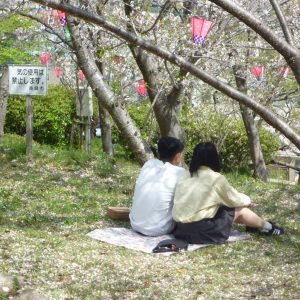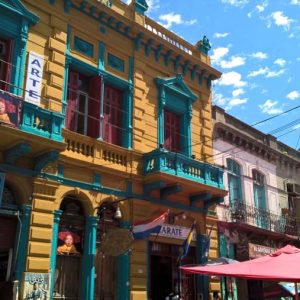The North Pennines is an Area of Outstanding Natural Beauty. It tends to be ignored by visitors who rush through County Durham on their way north to Scotland. They miss some of the best scenery in Britain and a lot of attractions, many which are geared up for disabled visitors.
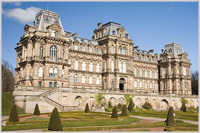 Bowes Museum
Bowes Museum
This must rank as one of the best museums outside of London or Edinburgh. It is an amazing collection of ceramics, paintings, furniture and costumes started by the great art collectors John and Josephine Bowes in the mid 19thC. They built the splendid French Château building on the edge of Barnard Castle to house the contents. There is something to attract everyone but the pièce de résistance must be the silver swan, a musical automation dating from the late C18th which still performs every day at 2pm.
There is a large car park at the back of the château, or disabled visitors may be dropped off at the entrance. Although there is a flight of stairs to the main entrance, wheelchair users can gain admission at the east door where there is an intercom button to press. All of the museum is accessible and there is a lift to the galleries on the upper floors. There are plenty of seats for visitors. Assistance dogs are welcome, and they have information in large print. There are disabled toilets on ground and first floor as well as a shop and tearoom. A carer is admitted free.
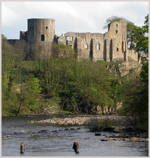 Barnard Castle
Barnard Castle
Barnard Castle is a busy small market town still retaining a range of small locally owned shops. The castle is set high above a cliff above the River Tees. It has an illustrious history being built by the Balliol family and passing to the Nevilles after the defeat of John Balliol by Edward I. It passed to Richard III through his marriage to Anne Neville. It is a huge castle with curtain wall with defensive towers and a huge keep.
There is parking by the castle. Alternatively, visitors can be dropped off by the main gateway. There is level access through the main gateway. The inside of the castle is neatly kept grass with some gravel paths. All of it is accessible apart from a flight of wooden stairs up into the keep, a lintel into the undercroft and steps down into the moat. There is a sensory garden and disabled toilets. There is a small shop but no refreshments, although there are plenty of eating places in the town. Carers are admitted free. Assistance dogs are welcome.
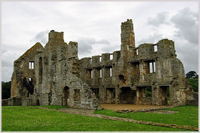 Egglestone Abbey
Egglestone Abbey
The ruins of a small and not very wealthy Premonstratensian ‘white canons’ abbey stand high above a bend on the River Tees. The ruins include part of the nave and chancel of the abbey church. The cloisters and other buildings are marked by an outline in the grass. After the Dissolution of the Monasteries, part of the north and east ranges were converted into a splendid stately home. The east wall still stands to nearly its full height.
The ruins are open 10-6 and entry is free. The gate into the ruins is wide enough for a wheelchair. The grass is rough but kept short and shouldn’t present problems unless it has been very wet. There is level access into the buldings except for a flight of stairs to the first floor of the monk’s living quarters, but there isn’t a lot to see there.
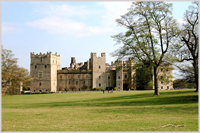 Raby Castle
Raby Castle
Raby castle, once the stronghold of the powerful Neville Family, guards the entrance to Weardale. It is a splendid castle surrounded by an extensive deerpark with herds of red and fallow deer. There is a walled garden, herbaceous garden, extensive walks around the deer park as well as a shop and cafe.
Disabled visitors can be dropped at the castle entrance and there are disabled parking bays here. There is more disabled parking in the courtyard by the shop and cafe. Wheelchairs are available from the castle entrance hall and can be used round the outside of the castle. Others are available from the Coach House for use around the grounds and gardens. There is level access into ground floor of the castle which has a DVD about the castle for disabled visitors. There are steps from the entrance hall to the rest of the castle and no wheelchair access. The walled garden with its yew hedges and ornamental pond is on a slope, so wheelchair pushers may need to be strong. Roads round the deer park are tarmac. There is level entrance to the cafe in the old stables, through the shop. The disabled toilets at the end of this block. There are none in the castle. Assistance dogs are welcome inside the castle and gardens.
Disabled visitors are charged at the concessionary rate. Those who unable to access the castle can be admitted to the castle to view the DVD with a parks and gardens ticket. Carers are charged a similar rate.
Staff are excellent, understand the needs of the disabled and willing to help.
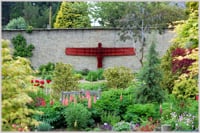 Egglestone Hall Gardens
Egglestone Hall Gardens
These are very attractive gardens in the walled garden of Egglestone Hall with beautiful herbaceous borders, winding paths, trees, shrubs and a small stream. Part of the garden is a nursery selling a wide range of plants with many varieties not seen elsewhere, all in good condition and reasonably priced. There is a shop and restaurant in the old coach house by the car park
Entry to the nursery is free. There is an honesty box for the gardens. Adults are £2.50 and a notice explains in a humorous way that there are no concessions for anyone. Paths round the gardens are either gravel of over grass. Gradients are gentle, and the gardens are fully accessible, as is the cafe and shop. There is a disabled toilet in the cafe.
• Visit website
• Website for the nursery, shop and cafe
• Read review
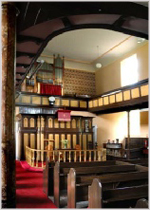 Weardale Museum and High House Chapel
Weardale Museum and High House Chapel
This is a small local history museum in the manse next to the chapel in Ireshopeburn. It covers the history of the area with information on lead mining, railways, John Wesley and Methodism. There is a reconstruction of a typical Weardale kitchen from about 1870. Entry also includes admission to High House Chapel which is the oldest purpose built chapel in the world still in use with a Sunday service.
The Museum was established and is run by volunteers who are delighted to see visitors and go out of their way to be welcoming. There is parking at the back of the museum with dedicated disabled parking. Alternately disabled visitors can be dropped off by the door on the main road which has the best access for wheelchair users. There is level access to the two downstairs rooms and the chapel. Stewards will move things to improve wheelchair access. There is a big A3 picture book covering the upstairs galleries and stewards will if possible bring smaller items down for visitors to see. There is a disabled toilet, but the museum does not serve refreshments. Entry is £3.
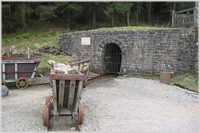 Killhope Lead Mining Centre
Killhope Lead Mining Centre
Upper Weardale was a major lead mining site in the C19th and one of the sites has been restored to show what a C19th mine was like. It is one of the most complete lead mining sites in Britain with waterwheel, mine shop where the miners lived during the week and the machinery used to crush and extract the lead ore from the waste rock. This is now a lovely site, surrounded by wild flower meadows.
During restoration great effort has been taken to make the site as accessible as possible. Disabled parking is near the entrance. There is level access to all the reception area with shop, cafe and small exhibition as well as the ground floor of the mine shop. There is ramped access to the upper floor of the mine shop and also the buildings extracting the lead ore. There are steps to the waterwheel, but this can be admired easily from below. Paths around the site are well maintained gravel. There is a mobility scooter which can be hired. Dogs are welcome. There is a disabled toilet in the cafe and another on the site.
Staff are very aware of problems facing disabled visitors and are very helpful. One member of staff can use sign language and there is information available in large print. There is an interpretive audio cassette for the exhibition area. Disabled visitors get entry at the concessionary rate and carers are admitted free.
• Visit website
• Read reviews
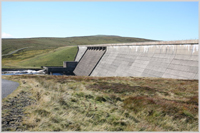 Cow Green Reservoir
Cow Green Reservoir
The reservoir was built at the top of Teesdale to provide water for industrial Teesside and is at the centre of the North Pennines Area of Outstanding Beauty. This is some of the wildest scenery in Britain and magnificent walking country. There is a wheelchair friendly nature trail following a well-made tarmac path from the car park to the waterfall at Cauldron Snout. On a sunny day this is an exhilarating walk with only skylarks or curlew for company. At 1600’ weather conditions can change quickly so go prepared with waterproofs and a spare seater.
There are no facilities at the car park apart from a portaloo. Langdon Beck Hotel on the B6277 is open all day and serves meals.
• Visit website
• Details of trail (numbers 1-5)
• Read review
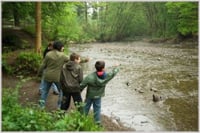 Hamsterley Riverside footpath
Hamsterley Riverside footpath
Hamsterley forest is an attractive area of mixed deciduous and coniferous plantations along the sides of the sheltered Bedburn valley. Forest roads make good and easy walking and are ideal for wheelchair users. Alternatively there is the wheelchair and pushchair friendly Riverside Footpath. This is a well-made level stone surface following the beck, with the chance of seeing kingfishers and dippers. The four-mile drive from the Visitor Centre to Blackling Hole Car park takes you through the heart of the forest. Part is along tarmac roads, the rest is along forest roads. There is a cafe and accessible toilets.
Read more about Accessible Attractions in Great Britain

